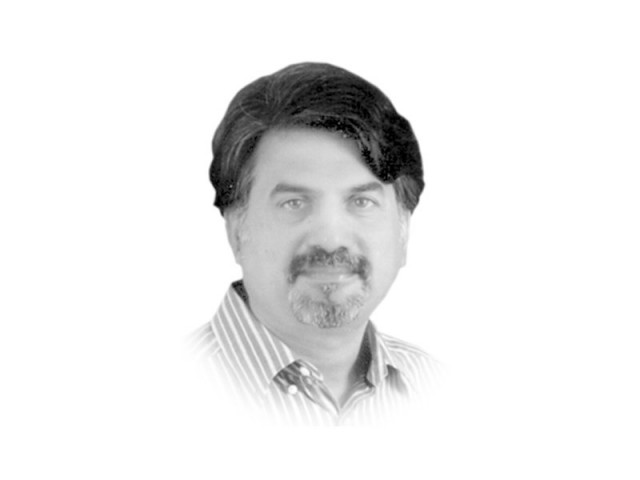FATF: war by other means
Concern of America is not nuclear proliferation in the Middle East but economic benefits it extracts from nuclear deal

The writer is a retired lieutenant colonel of the Pakistan Army and a PhD in civil-military relations
Given that low-intensity conflict is the dominant force of war today and sub-state actors the predominant force, war it seems is no longer politics — but ‘economics by other means’. Using economic instruments to produce geopolitical effects is now the more suitable and ‘response drawing’ technique of statecraft which can be used by great powers to advance geopolitical ends utilising a watchdog like the FATF not only to alter the political behaviour but also punish economically countries that don’t subscribe to or resist and challenge the United States established rule based world order.
This policy of ‘economic denial’ that defines war as ‘economics by other means’ employs coercive form of geo-economics and targeted measures to elicit specific results. The objective of this economic form of warfare is pretty clear: sending a message to the people and the government of the targeted country that if doing something that is not beneficial in economic terms how can it be in political terms?
It is important for us to understand that those that have been demanding from us ‘to do more’ have now set a new boundary between ‘us and them’. What will shape this boundary will be our agreement or disagreement on how we are also ready to put on the same glasses with which they see the world. They will not mass forces against us (hard power), they will mass effects (soft power) to pressure us. Are we ready?
Today the mood of the nation should be of doom and gloom. Naturally every nation has a certain worth. Treated as worthless, anger must seep in but most importantly it’s not the anger but the sense of shame that sets in only when not living up to your own sense of worth is your own doing. The real question that we must ask ourselves here is whether we have been evaluated correctly? Why is the world’s political and diplomatic weight so heavily tilted against us? Why have even countries like Saudi Arabia, China and the GCC chosen to abstain or remain neutral in this hour of our national predicament?
China itself is utilising ‘economic warfare’ to produce some of the most profound geopolitical effects since the world emerged from the Cold War era. Its sphere of influence is not restricted to Asia and Europe but has extended far and beyond reaching out to even Latin America where it is extending loan to the 33 member countries of the Confederation of Latin America and Caribbean States. The mutual trade between China and these countries has shot up to $200 billion since 2014. Exports to China by these countries have increased by 30%. China is financing the construction of a port in Colombia, it is upgrading Argentina’s railways and its loan to Latin America has totaled $9 billion only in the last year. Why would China not want to remain neutral? It would rather have Pakistan join forces that conduct ‘war by economics’ rather than be on the receiving end.
Saudi Arabia and GCC member countries are also a huge beneficiary of the benefits of the world economic warfare. A South Korean firm is close to finishing the first operational nuclear power reactor in the desert 220kms from Abu Dhabi. Saudi Arabia in the coming years plans to construct 16 nuclear reactors at a cost of $80 billion. The firm bidding for this Saudi construction project is American ‘Westinghouse’ that filed for bankruptcy last year. With president Trump having promised to revitalise the ailing American nuclear industry, it is geo-economics and not geopolitics that binds these two countries in an enduring relationship. The concern of America is not the possible nuclear proliferation in the Middle East but the economic benefits that it can extract from this nuclear deal.
In a cost-benefit analysis and that is actually what the world wants us to do we must bring about strategic and doctrinal clarity in our settled political and military approach. The deliberation carried out by the FATF might seem to us one-dimensional as it has nothing to say on states executing ‘state terrorism’ — no adjustment of economic doctrine and no correction of error there but in a real world that we live the creators of this (im)perfect world have now blamed (scapegoated) us for not only our but their failure as well.
“In this extreme trial of strength and stamina” — war as defined by Clausewitz and which we continue to fight for our choices are flawlessly clear. The forces of extremism are our enemies not because the world tells us that but because no state that values its freedom and independence can sustain them for long. It must do everything to stop it from proliferating in its society.
This is definitely a ‘must time’ for us. A quick course correction with demonstrable actions is now a must. Pakistan has weathered many storms before and like a seaman’s knowledge of the unusual conditions it retains the national will and ability to weather this storm as well.
Published in The Express Tribune, February 27th, 2018.
Like Opinion & Editorial on Facebook, follow @ETOpEd on Twitter to receive all updates on all our daily pieces.















COMMENTS
Comments are moderated and generally will be posted if they are on-topic and not abusive.
For more information, please see our Comments FAQ